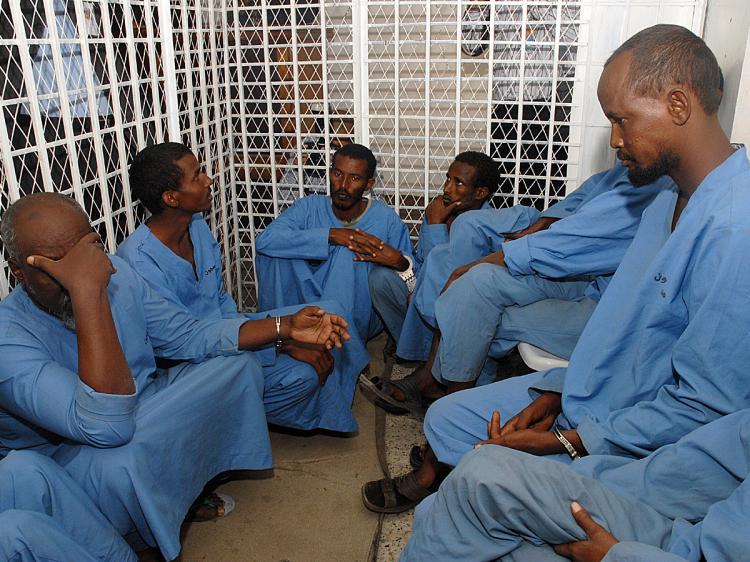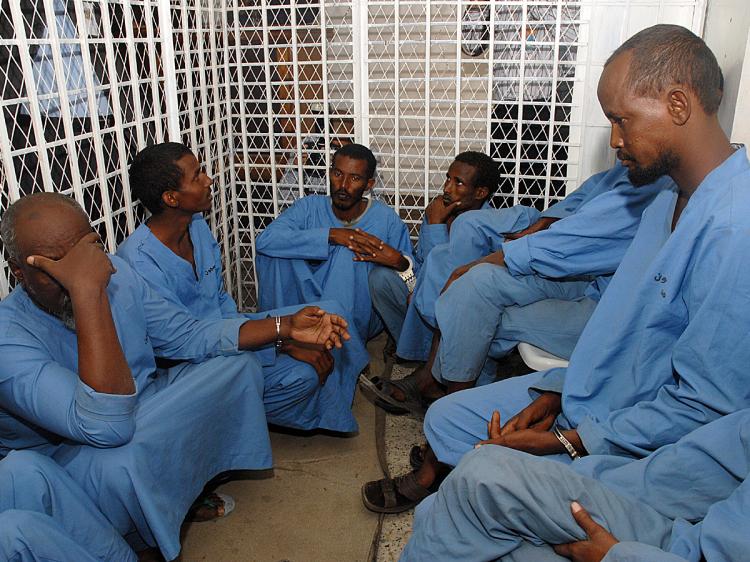Six Somali pirates, captured by Yemeni forces in April last year, were sentenced to death by a Yemen court on Tuesday. Six others were sentenced to 10 years imprisonment and together must pay $2 million compensation for hijacking an oil tanker.
On April 26, 2009, they hijacked the Yemeni ship Qana, owned by Adan Refinery Company, near the coast of Yemen. Yemeni forces recaptured the ship and took 12 pirates prisoner, but two crew members were killed in the struggle.
Somalia has lacked effective government since Gen. Siad Barre was violently ousted in 1991. Amidst the instability pirates began terrorizing ships passing through the Gulf of Aden for the coast of Somalia.
Since 2005 groups like the International Maritime Organization have expressed concerns about piracy, and for the last two years 20 countries have been engaged in actively repressing acts of piracy by military force.
In spite of this, piracy is increasing, the territory in which it takes place is expanding, weapons are modernizing, and pirates’ self-organization is improving.
One of the major enablers for these shifts has been the lack of legal follow up. When pirates are captured in international waters they cannot be tried under international law, and have to be tried in the country of the captor. Many legal systems are not well equipped to deal with pirates, which is why last week the Russian navy put captured pirates in an inflatable boat, confiscated their weapons, and cast them adrift on the ocean.
Last April a resolution was approved that appealed to U.N. Secretary-General Ban Ki-moon to create in three months a draft of an international legal framework for countering sea piracy. It is hoped that it will end the legal troubles that allow pirates to be on the loose.
On April 26, 2009, they hijacked the Yemeni ship Qana, owned by Adan Refinery Company, near the coast of Yemen. Yemeni forces recaptured the ship and took 12 pirates prisoner, but two crew members were killed in the struggle.
Somalia has lacked effective government since Gen. Siad Barre was violently ousted in 1991. Amidst the instability pirates began terrorizing ships passing through the Gulf of Aden for the coast of Somalia.
Since 2005 groups like the International Maritime Organization have expressed concerns about piracy, and for the last two years 20 countries have been engaged in actively repressing acts of piracy by military force.
In spite of this, piracy is increasing, the territory in which it takes place is expanding, weapons are modernizing, and pirates’ self-organization is improving.
One of the major enablers for these shifts has been the lack of legal follow up. When pirates are captured in international waters they cannot be tried under international law, and have to be tried in the country of the captor. Many legal systems are not well equipped to deal with pirates, which is why last week the Russian navy put captured pirates in an inflatable boat, confiscated their weapons, and cast them adrift on the ocean.
Last April a resolution was approved that appealed to U.N. Secretary-General Ban Ki-moon to create in three months a draft of an international legal framework for countering sea piracy. It is hoped that it will end the legal troubles that allow pirates to be on the loose.




